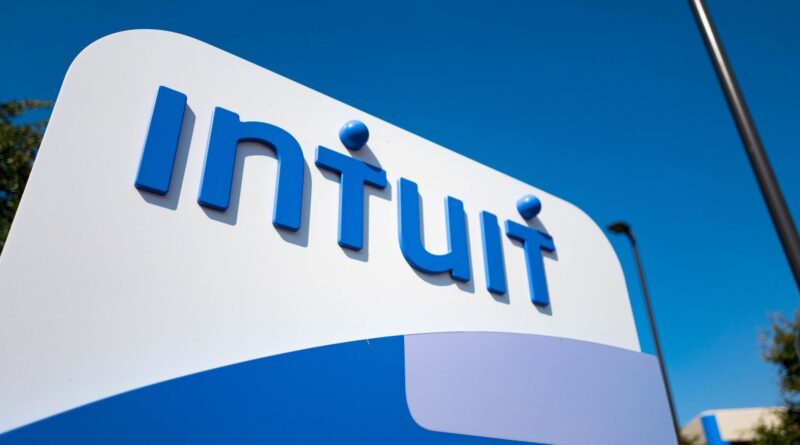Intuit’s shift
If artificial intelligence feels like it is taking over the world, that feeling has become an anxious obsession among larger tech companies.
These are organizations that have typically thrived secure in the knowledge that they can keep a competitive edge through their very DNA: leveraging software to build more interesting, faster and disruptive products.
Now, a big question hangs above all of them: Will the evolution of AI supercharge that whole model, or will it disrupt them, the previous generation’s disruptors?
Intuit, the U.S. financial and accounting software behemoth, is among those sincerely hoping that it lands in the first of those camps. It may not have been at the forefront of developing generative AI, the plat du jour in tech, but it happens to have registered 700 AI-related patents covering areas like natural language processing and machine learning.
And in its artillery is also the “oil” that many AI machines need to work: a trove of data and data infrastructure — including 730 million customer interactions and 58 billion machine learning predictions daily over the last five years — that it believes will help catapult it into a strong position in the future.
But as you might guess, it hasn’t been a fully smooth ride.
Intuit’s move, led by CEO Sasan Goodarzi, to becoming an AI-driven company has been well conveyed. Some of that has not been easy. In 2020, the company laid off over 700 employees, people working in less critical roles, adding a similar number of new roles, to mark a shift toward its AI plan.
And big bets like Credit Karma — a high-profile acquisition for Intuit, buying it for $7.1 billion in February 2020 — saw “revenue challenges” that resulted in a halt in hiring last year. At the time, the division’s then chief people officer Colleen McCreary blamed it “due to the uncertainty of the economic environment.”
Daniel Jester, director of equity research for software at BMO Capital Markets, told TechCrunch that while Intuit has framed the strategic vision as an “AI-driven expert platform,” its actual execution of that has not been quite so revolutionary. Intuit is currently focused on using AI and machine learning to augment the platform — not to build a full-scale replacement for financial experts in its tax and accounting software business.
“In the near-term, similar to most companies, Intuit as an overall organization is attempting to drive efficient growth in a macro environment which has become more challenging for many of their customers,” he said. “But like many companies of its size, the factors impacting their success vary depending on the business unit.”
On top of all this, Intuit also has a reputation of pushing against disruption in areas that might threaten its business. Specifically, it’s known for its strong lobbying efforts against free tax services in the U.S. Now, it looks like that is a hot potato Intuit could end up eating one way or the other: win the argument against free tax services; or win the business by making more compelling paid products that use AI.
And that is the point: There remains still a lot of potential, and now that having an AI strategy is a must for tech businesses being scrutinized in the public markets, the company’s AI tune is getting louder. Intuit’s chief data officer Ashok Srivastava believes the company has the right mindset, based on the strategy that it set several years ago to position itself as an “AI-driven expert platform.”
That is to say, Mountain View-based Intuit’s portfolio of services — which includes platforms to manage personal finance (Credit Karma), marketing automation (Mailchimp), accounting (QuickBooks) and income tax returns (TurboTax) — all have had, and will be getting, more of the AI treatment.
“The AI that we build is built on a very vast data infrastructure that we’ve been creating over the last many years,” said Srivastava in an interview. “This enables real-time data, enables streaming use cases, batch processing, all the manipulation, all of the storage. And most importantly, the transmission of clean data happens in this infrastructure layer.”
Srivastava joined Intuit in 2017 after cutting his teeth at IBM, Sama and NASA, where he handled technical and financial projects. He told TechCrunch that the goal with the AI strategy is to deliver “more money,” “reduce work” and “complete confidence” to customers.
If data is the new oil, then I would argue that AI is the new electricity.
“Very few companies have the customers, the scale of data that we have and the expertise that we have,” he said. “There will always be competitors. But we’re singularly focused on the customer’s needs.”
He believes that companies without AI capability will not survive over time. “If data is the new oil, then I would argue that AI is the new electricity,” he said.
Generative AI behind the scenes
AI — both the talent to build it and work with it, as well as the tech itself — has been in demand for some time, but generative AI, which essentially works as a branch of AI that uses a large amount of data to create machine-generated content such as text, image and video, has taken interest and demand to new levels.
Various consumer-focused companies have started deploying generative AI on top of their products and services to attract customers and increase efficiency, and simply to ride the wave of hype in the space.
Companies like OpenAI have opened the door to the idea of a “general” AI capable of addressing any and all scenarios. But before that, companies like Intuit have been working on generative AI well before that to address more narrow use cases, according to Srivastava.
One example Srivastava shared: live services within TurboTax and QuickBooks that allow customers to interact with human experts. Instead of letting the experts type notes as the customer is talking to understand their problem and offer them solutions, automatic transcripts are generated to keep a record of the conversation.
After that, a generative AI capability summarizes the conversation into a few key steps to save everyone time at the end of the chat.
Intuit also uses an AI-native experience to optimize data flows based on the financial transaction data it gets from customers.
“We at Intuit deal with an enormous amount of financial transaction data. And as this data comes into our platform, we need to automatically categorize that data into different buckets for our customer,” said Srivastava. “What makes this problem hard is each customer has a different need for categorization. It’s completely personal… We actually reinvented this entire experience with artificial intelligence. We are building one model per customer, so that as this data flows in, each model does that optimization.”
India playing a critical role in AI strategy
Intuit has its second-largest team in India after the U.S., with more than 1,600 employees working from Bengaluru. These employees are primarily tasked to help build solutions for global markets.
“India plays a critical role in our artificial intelligence strategy,” said Srivastava. “One of the unique things about India is that it’s showing a tremendous opportunity in terms of the talent and the skills that we have here.”
Indian engineers at Intuit work on AI, data and other capabilities that are being built into payroll and other parts of the company’s stack. Srivastava told TechCrunch that one of the key developments coming from the South Asian nation is an AI model for the mid-market.
Stating how the Indian engineers help the company fulfill its plan to become an AI-driven player, Srivastava said he saw the local team developing a solution that includes deep statistics and machine learning to converse with customers and generative narratives. The solution is currently showing results using templates, but those will soon be converted into generative AI.
“There are other areas in AI that the team has focused on, including modeling, churn and other aspects,” Srivastava said.
Although India has been an important market from the engineering perspective, Intuit does not consider the country a significant consumer market. It discontinued QuickBooks for Indian customers in January this year. However, the company, which celebrated its 18th anniversary in the country this year, has committed to continue to support and invest in Indian talent.
Pivoting from one model to another
It is not the first time that Intuit has planned a pivot from a legacy software vendor. The company has a history of going through a number of shifts to stay relevant in the market. That includes recent acquisitions, such as those of Credit Karma and Mailchimp, which were made to expand to new kinds of business verticals.
Those moves have already helped the company see 32% year-on-year growth in revenue to $12.7 billion in the fiscal year 2022. Now, the ongoing shift toward AI is expected to expand the company’s growth further.
“Firms like Intuit could benefit from implementing the multiple pillars of AI that include descriptive analytics, predictive analytics, causal analytics and prescriptive analytics,” said Anindya Ghose, Heinz Riehl Chair Professor of Business at New York University’s Leonard N. Stern School of Business.
“They will need to invest in the right infrastructure and resources to determine which of these four pillars are most relevant to their lines of business. They need to identify complementarities between human intelligence and machine intelligence.”
Nonetheless, Intuit has challenges while looking to grow as an AI-driven company.
Steve Enders, a software research analyst at Citi Research, told TechCrunch that one of the biggest challenges for the company in the consumer segment is the growing advancements coming from generative AI. A recent GPT-4 demo suggested that the solution would be ready to complete users’ taxes using its advanced algorithms.
There has also been that nascent concern about competition in the overall tax market with reports of the U.S. expanding its free tax service, the analyst said referring a significant challenge for Intuit’s TurboTax.
When asked about TurboTax, free services and whether AI would ever play a role in a new product from Intuit, Srivastava avoided a direct answer, claiming that AI in any form is intrinsic value to the company.
“Sometimes there are prominent uses of AI, sometimes there are not. But either way, people know that we’re working to deliver value for them. And that’s what we’re known for, something I’m very proud of,” he said.
Enders also pointed out that in the SMB segment, where Intuit targets QuickBooks, the company was moving into the mid-market, as well as trying to become more critical to its existing SMB customers by providing a broader portfolio of software solutions.
In the credit segment where the company has Credit Karma, the analyst said the biggest challenge is macro-related, with tightened lending standards from banks leading to fewer financial products being sold to consumers.
“I think there is always some risk of potential new competitors coming in, but Intuit should have a data and training set advantage given their dominant share in the tax and SMB accounting world,” he said. “Speed to market for some up and coming solutions may matter a bit more, particularly for CRM/marketing solutions in the SMB segment, but that is still a work in progress.” This is where those “revenue challenges” have also played out.
Jester at BMO said that in the long term, it would be Intuit’s ability to harness its platforms to deepen relationships with customers and drive retention across the customer journey.
As the AI revolution marches on, it will be exciting to see how Intuit continues to transform its business in the years to come and uses its resources from markets including India to develop competitive solutions effectively for the future.
Intuit’s shift by Jagmeet Singh originally published on TechCrunch





